Key takeaways:
- Minimalist literature emphasizes simplicity, allowing readers to connect deeply with characters and emotions through sparse narratives.
- The interaction between music and minimalist literature enhances emotional experiences, highlighting the power of silence and restraint in both mediums.
- Notable minimalist works, such as those by Haruki Murakami and Anne Carson, illustrate how brevity can evoke profound imagery and feelings.
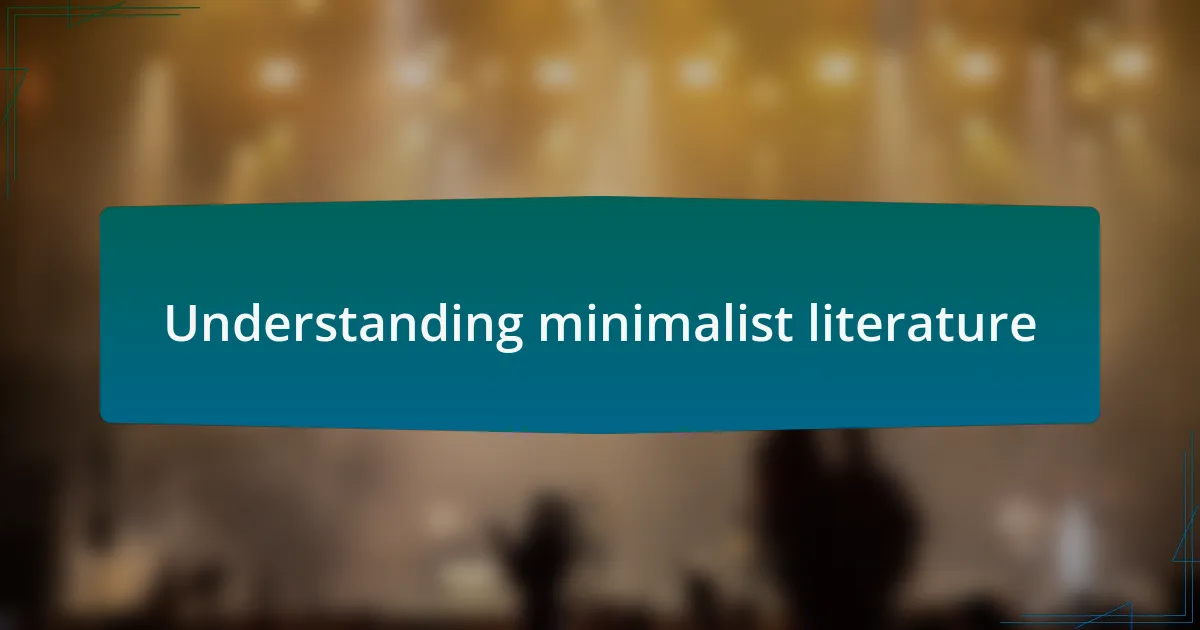
Understanding minimalist literature
Minimalist literature focuses on the essentials, often stripping away excess details to highlight the core of human experience. This can be particularly powerful, as I’ve found that fewer words can sometimes evoke a deeper emotional response than elaborate descriptions. Have you ever come across a story that felt raw and real simply because of its simplicity?
When I dive into minimalist works, I often feel an immediate connection; it’s like seeing a photograph in black and white. Each element stands out with intentionality. For instance, I once read a short story that captured a single moment in time—a character sitting alone on a park bench. It resonated with me because it reflected a universal feeling of solitude, emphasizing how sometimes less is truly more in conveying emotion.
Minimalist literature often invites readers to fill in the gaps, fostering an interactive experience. I remember discussing a minimalist piece with a friend, and we both walked away with different interpretations of the same text. Isn’t it fascinating how a sparse narrative can spark varied thoughts and emotions? This engagement leads to a deeper understanding of not just the text itself, but of our own perceptions and experiences.
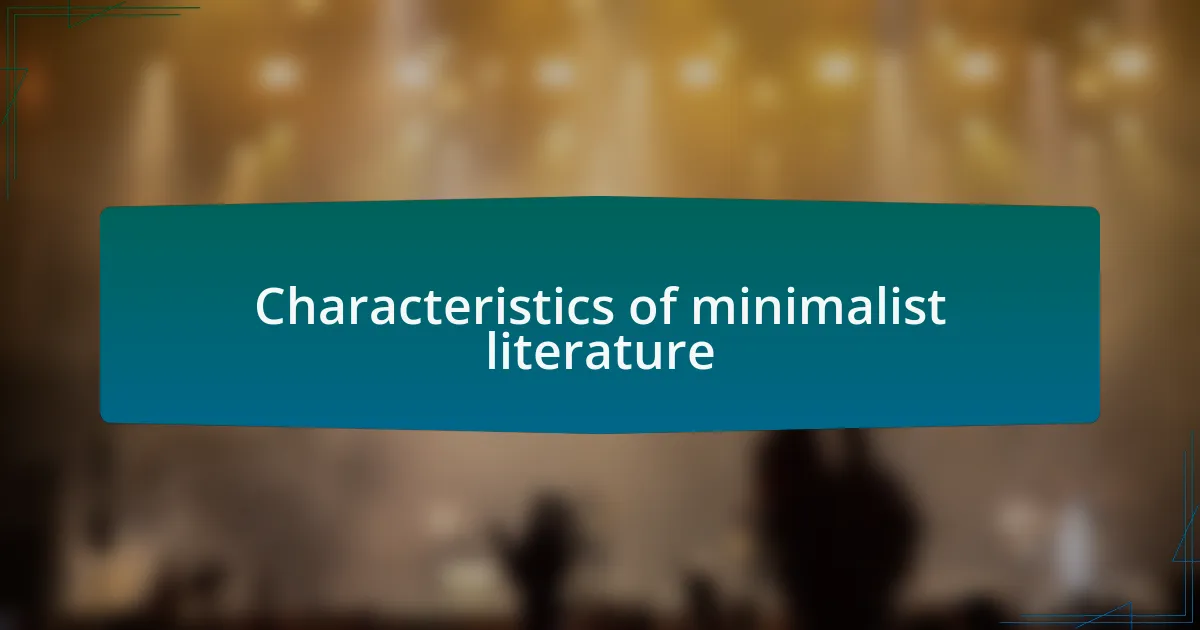
Characteristics of minimalist literature
Minimalist literature often employs a stark economy of language, using brevity to convey thoughts and emotions with clarity. The beauty of this style lies in its ability to create vivid imagery through simple, unembellished statements. I once read a poem that was merely a few lines long, yet its imagery of a solitary wave crashing against a shore lingered in my mind, reminding me of how powerful a single image can be.
Characters in minimalist literature are often crafted with careful precision; they aren’t over-explained or burdened with backstories. Rather, their thoughts and feelings emerge primarily through their actions and subtle dialogue. I recall a novel where a character’s struggle was implied through their small, day-to-day decisions, rather than outright stated. This left room for me to reflect on my own choices, connecting deeply with the character’s journey without needing detailed exposition.
Another defining feature is the use of simple settings that reflect the characters’ inner worlds. I remember being captivated by a story set entirely in a small diner; its quiet atmosphere mirrored the protagonist’s sense of isolation. How does a space shape our emotions? For me, that diner became a focal point of connection, illustrating how minimalist literature allows readers to dive deeper into the emotional truths underlying a seemingly straightforward narrative.
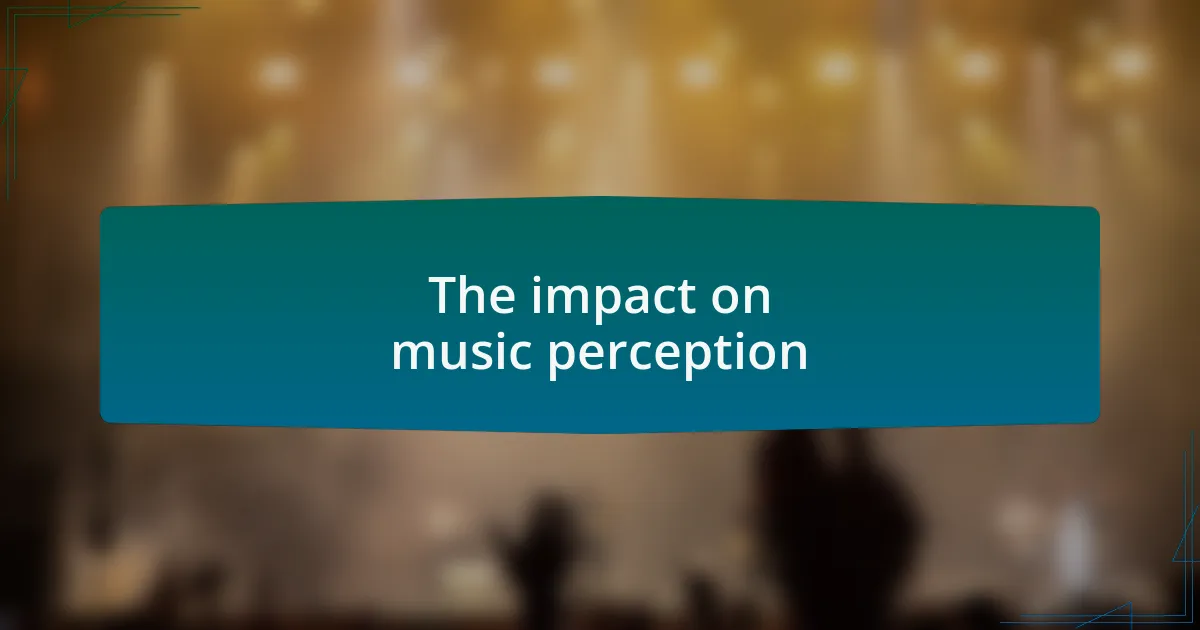
The impact on music perception
The subtlety in minimalist literature can significantly alter how we perceive music. I remember sitting in a quiet café, listening to a minimalist composition while reading a short story. The simplicity of both the music and the prose allowed me to pick up on nuances I might have overlooked otherwise. It made me wonder: how can stripping away complexity in music, much like in literature, lead to a more profound emotional experience?
When music mirrors minimalist themes, it often emphasizes space and silence, allowing the listener to engage with the sound in a more impactful way. I recall attending a performance where the absence of a full orchestra created a tense atmosphere, as every note lingered just long enough to capture my attention. This made me think about the power of silence in music—can we truly appreciate sound without understanding the weight of what’s unsaid?
Moreover, minimalist literature encourages us to focus on moments and details, mirroring the way minimalist music invites us to cherish each note and rhythm. In a particularly sparse piece I once heard, the simplicity made me reflect on the emotions behind each sound, leading to a deeper personal connection. Remembering those experiences illustrates how both forms can heighten our appreciation for subtlety, transforming our perception of what music can convey beyond mere notes.
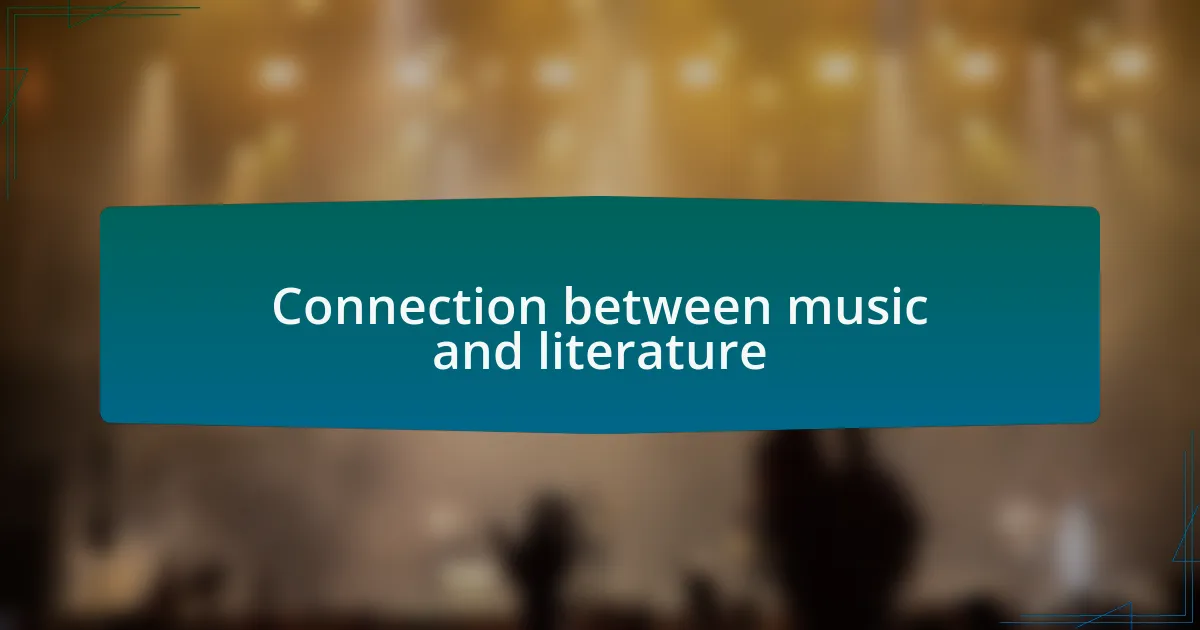
Connection between music and literature
Listening to music while diving into minimalist literature feels like a dance between sound and silence. I once attended a reading where the author shared their work alongside ambient music. The combination created an atmosphere where I could feel the weight of each word and note, almost as if each element supported the other. Does this interplay enhance our understanding of both forms?
There’s something quite magical about how both music and literature can evoke emotions through restraint. I think about a time when I was lost in a novel that left much unsaid; the pauses in the narrative echoed the quiet moments in a minimalist track. This experience made me realize how the power of suggestion in both mediums brings forth a spectrum of feelings, urging us to fill in the gaps with our own thoughts and experiences.
Exploring a sparse musical piece often reconnects me to the subtle imagery in literature. While listening to a composer who thrived on simplicity, I felt akin to how I react to a few sparse, poignant lines in poetry. It raises the question: how do these shared qualities in minimalism across music and literature shape our emotional landscapes? In these moments, I feel a palpable connection, reminding me that meaning often resides in what remains unsaid.
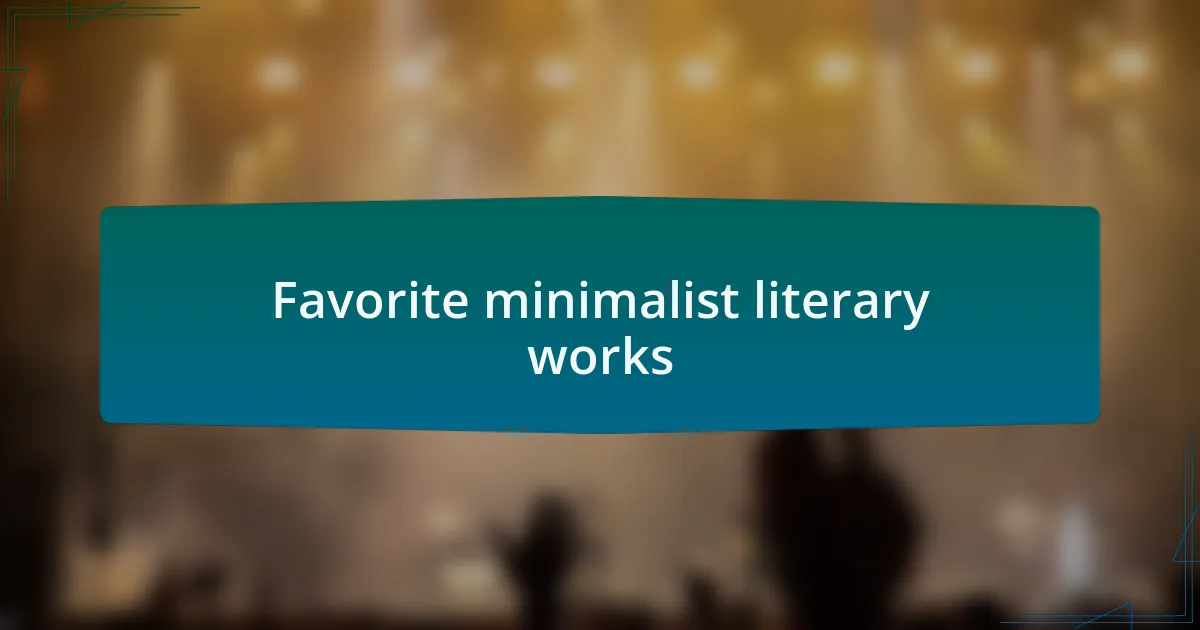
Favorite minimalist literary works
When I think about my favorite minimalist literary works, I immediately envision “The Elephant Vanishes” by Haruki Murakami. Each story in this collection is like a gentle rippling sound in my mind, leaving space for silence and wonder. I remember reading it during a quiet morning; the subtlety of Murakami’s narrative led me to reflect on the deeper meanings behind mundane events. Isn’t it fascinating how such sparse details can stick with us long after reading?
Another piece that resonates with me is “The Melancholy of Resistance” by László Krasznahorkai. The way he constructs sentences—often sprawling yet intricately woven—creates a rhythm akin to a slow, haunting melody. I recall feeling completely absorbed, lost in the ebb and flow of his prose, which felt almost musical. It makes me ponder: how do minimalistic approaches in writing influence our drive to search for significance amidst the chaos of our thoughts?
Lastly, poetry has always captivated me when it comes to minimalist literature. An example that stands out is “Ghosts” by Anne Carson. Each line acts as a piercing note—a stark reminder of absence. During a moment of solitude, I found her work resonating deeply within me. It’s curious how a few chosen words can evoke such powerful imagery and emotions, leaving a lasting impression. Have you ever experienced a poem that seemed to whisper directly to your soul?